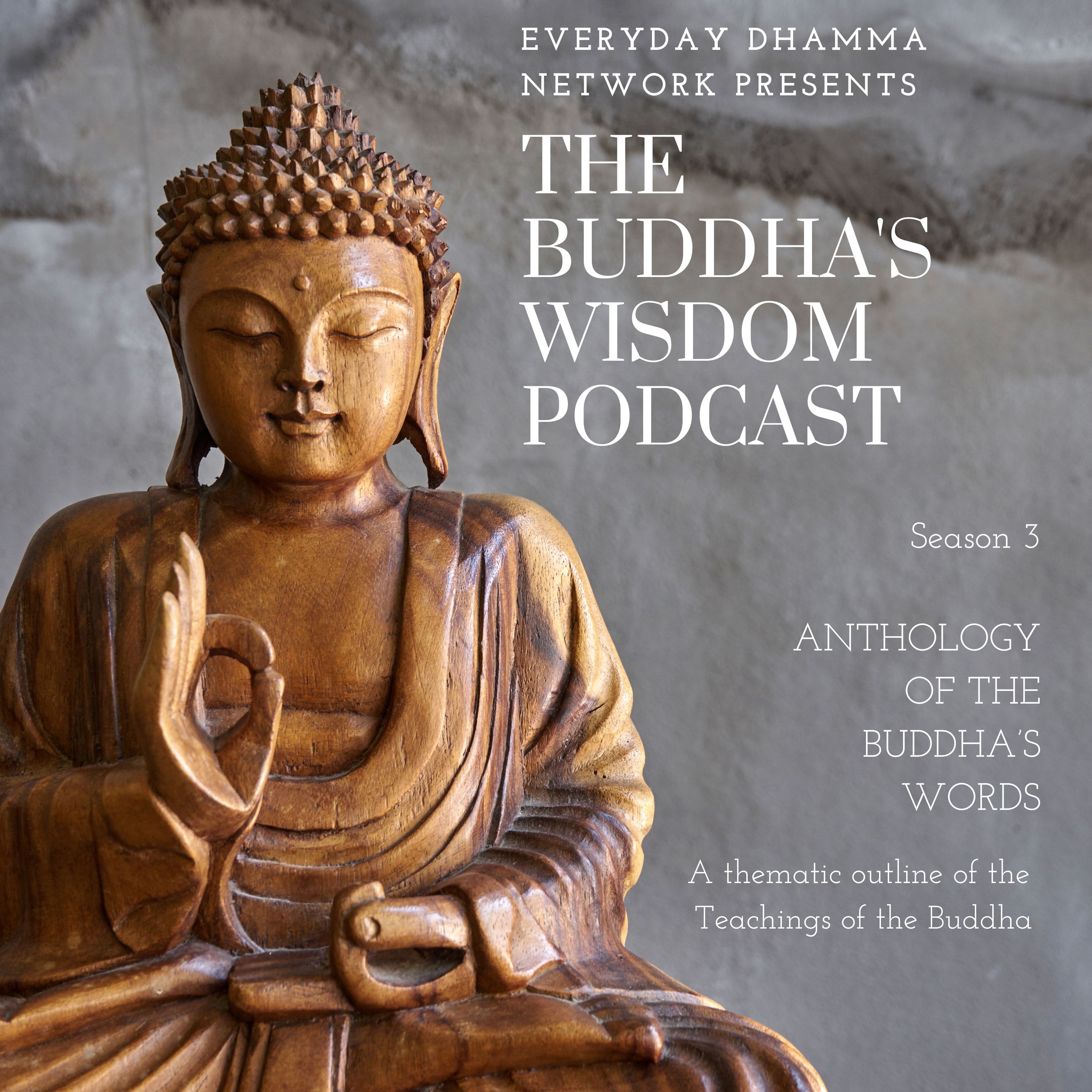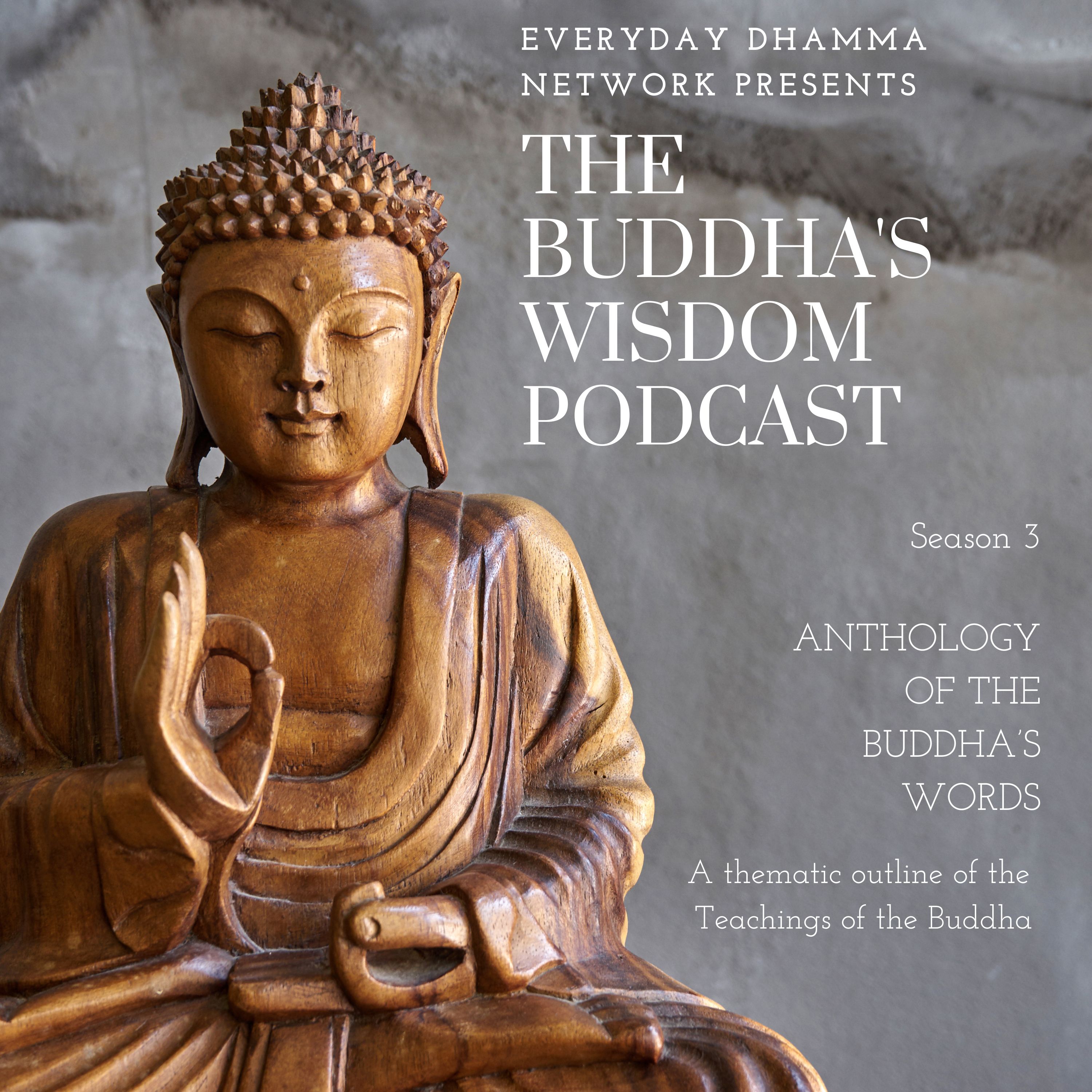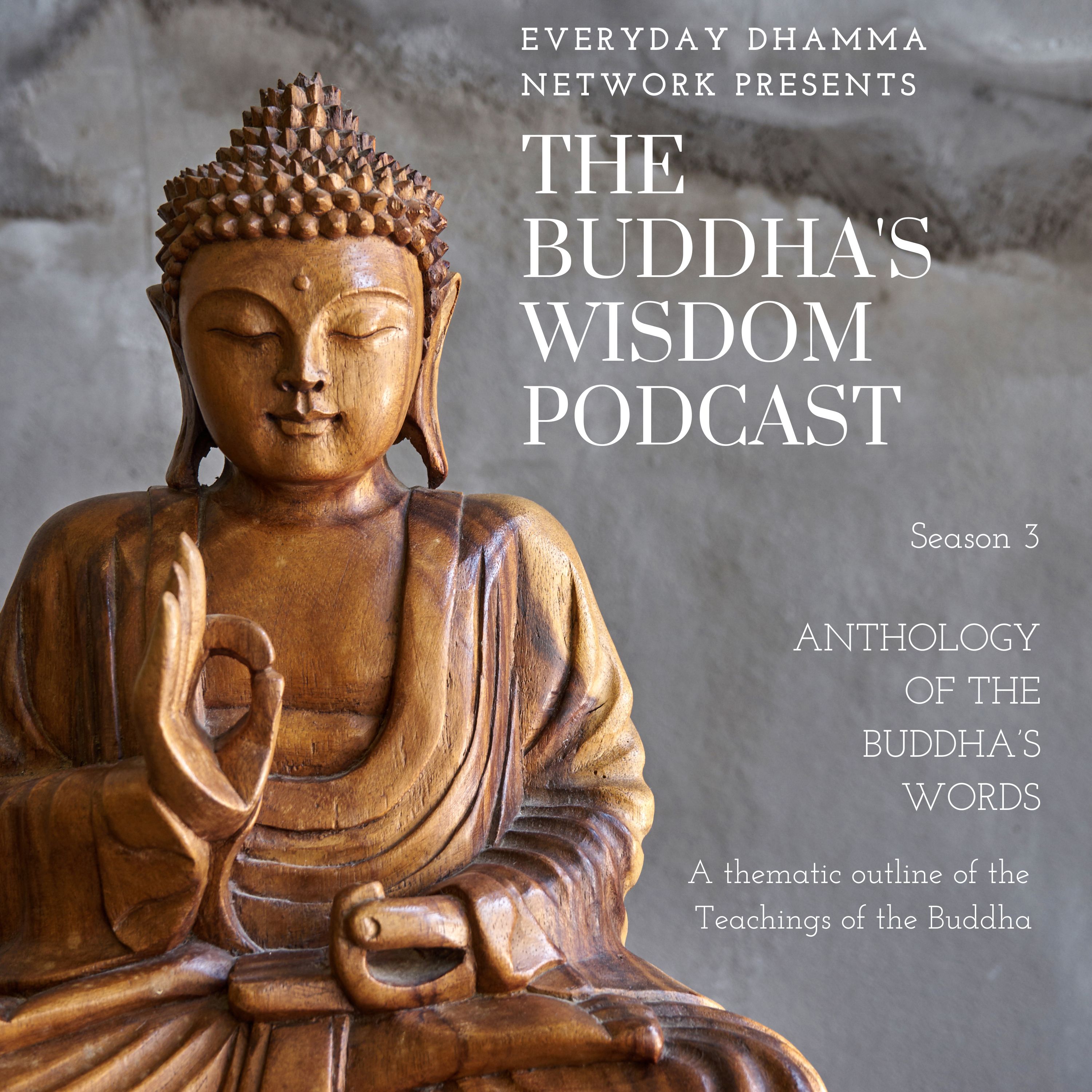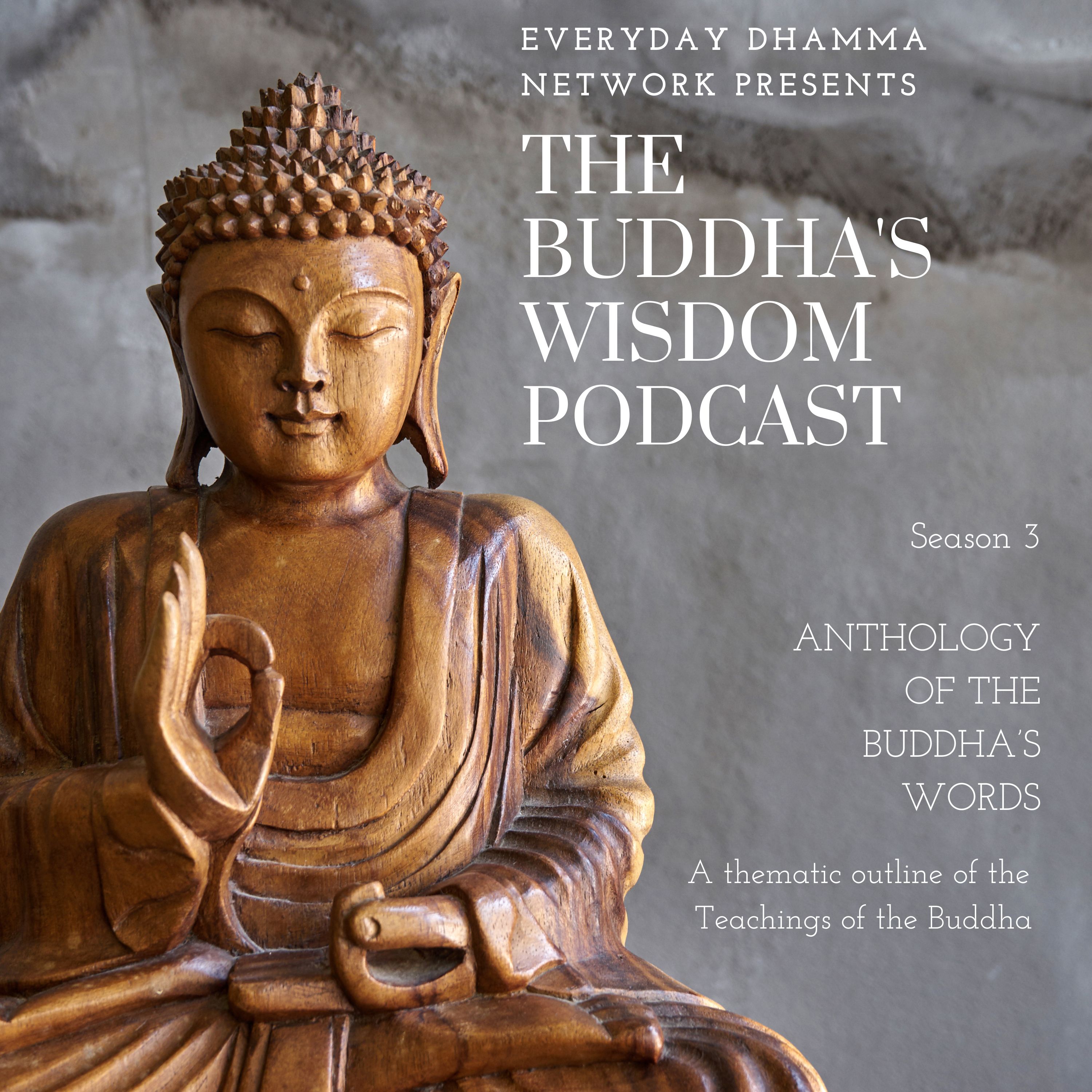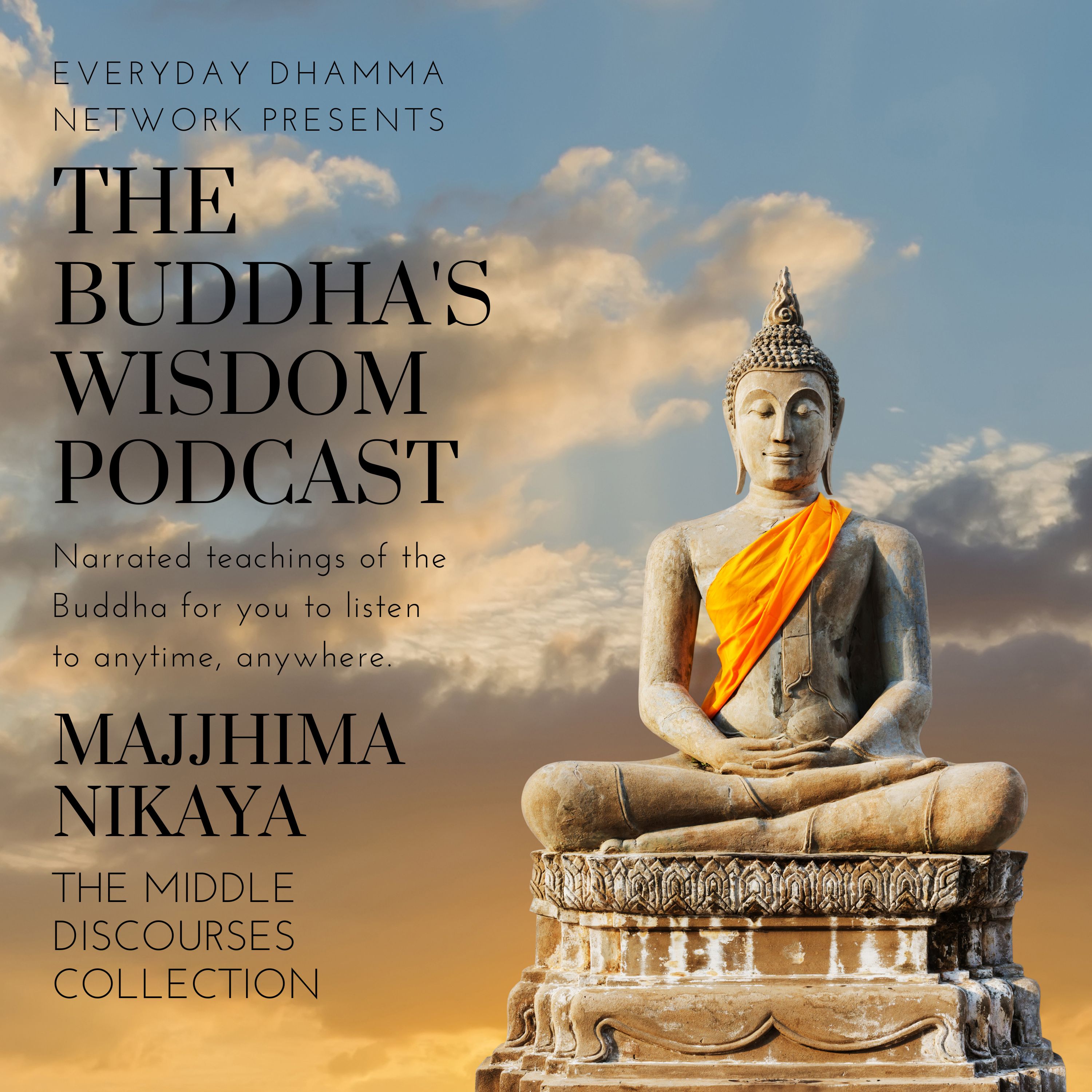Episode Transcript
## Sutta 1: Not a secret doctrine
“Mendicants, three things are conveyed under cover, not in the open. What three? Females are married with a veil, not unveiled. Brahmin hymns are conveyed under cover, not openly. Wrong view is conveyed under cover, not in the open. These three things are conveyed under cover, not in the open.
Three things shine in the open, not under cover. What three? The moon shines in the open, not under cover. The sun shines in the open, not under cover. The teaching and training proclaimed by a Realized One shine in the open, not under cover. These three things shine in the open, not under cover.”
AN 3:131
## Sutta 2: No dogmas or blind belief
So I have heard. At one time the Buddha was wandering in the land of the Kosalans together with a large Saṅgha of mendicants when he arrived at a town of the Kālāmas named Kesamutta. The Kālāmas of Kesamutta heard:
“It seems the ascetic Gotama—a Sakyan, gone forth from a Sakyan family—has arrived at Kesamutta. He has this good reputation: ‘That Blessed One is perfected, a fully awakened Buddha …’ It’s good to see such perfected ones.”
Then the Kālāmas went up to the Buddha. Before sitting down to one side, some bowed, some exchanged greetings and polite conversation, some held up their joined palms toward the Buddha, some announced their name and clan, while some kept silent. Seated to one side the Kālāmas said to the Buddha:
“There are, sir, some ascetics and brahmins who come to Kesamutta. They explain and promote only their own doctrine, while they attack, badmouth, disparage, and smear the doctrines of others. Then some other ascetics and brahmins come to Kesamutta. They too explain and promote only their own doctrine, while they attack, badmouth, disparage, and smear the doctrines of others. So, sir, we’re doubting and uncertain: ‘I wonder who of these respected ascetics and brahmins speaks the truth, and who speaks falsehood?’”
“It is enough, Kālāmas, for you to be doubting and uncertain. Doubt has come up in you about an uncertain matter.
Please, Kālāmas, don’t go by oral transmission, don’t go by lineage, don’t go by testament, don’t go by canonical authority, don’t rely on logic, don’t rely on inference, don’t go by reasoned train of thought, don’t go by the acceptance of a view after deliberation, don’t go by the appearance of competence, and don’t think ‘The ascetic is our respected teacher.’ But when you know for yourselves: ‘These things are unskillful, blameworthy, criticized by sensible people, and when you undertake them, they lead to harm and suffering’, then you should give them up.
What do you think, Kālāmas? Does greed come up in a person for their welfare or harm?”
“Harm, sir.”
“A greedy individual, overcome by greed, kills living creatures, steals, commits adultery, lies, and encourages others to do the same. Is that for their lasting harm and suffering?”
“Yes, sir.”
“What do you think, Kālāmas? Does hate come up in a person for their welfare or harm?”
“Harm, sir.”
“A hateful individual, overcome by hate, kills living creatures, steals, commits adultery, lies, and encourages others to do the same. Is that for their lasting harm and suffering?”
“Yes, sir.”
“What do you think, Kālāmas? Does delusion come up in a person for their welfare or harm?”
“Harm, sir.”
“A deluded individual, overcome by delusion, kills living creatures, steals, commits adultery, lies, and encourages others to do the same. Is that for their lasting harm and suffering?”
“Yes, sir.”
“What do you think, Kālāmas, are these things skillful or unskillful?”
“Unskillful, sir.”
“Blameworthy or blameless?”
“Blameworthy, sir.”
“Criticized or praised by sensible people?”
“Criticized by sensible people, sir.”
“When you undertake them, do they lead to harm and suffering, or not? Or how do you see this?”
“When you undertake them, they lead to harm and suffering. That’s how we see it.”
“So, Kālāmas, when I said: ‘Please, don’t go by oral transmission, don’t go by lineage, don’t go by testament, don’t go by canonical authority, don’t rely on logic, don’t rely on inference, don’t go by reasoned train of thought, don’t go by the acceptance of a view after deliberation, don’t go by the appearance of competence, and don’t think “The ascetic is our respected teacher.” But when you know for yourselves: “These things are unskillful, blameworthy, criticized by sensible people, and when you undertake them, they lead to harm and suffering”, then you should give them up.’ That’s what I said, and this is why I said it.
Please, Kālāmas, don’t go by oral transmission, don’t go by lineage, don’t go by testament, don’t go by canonical authority, don’t rely on logic, don’t rely on inference, don’t go by reasoned train of thought, don’t go by the acceptance of a view after deliberation, don’t go by the appearance of competence, and don’t think ‘The ascetic is our respected teacher.’ But when you know for yourselves: ‘These things are skillful, blameless, praised by sensible people, and when you undertake them, they lead to welfare and happiness’, then you should acquire them and keep them.
What do you think, Kālāmas? Does contentment come up in a person for their welfare or harm?”
“Welfare, sir.”
“An individual who is content, not overcome by greed, doesn’t kill living creatures, steal, commit adultery, lie, or encourage others to do the same. Is that for their lasting welfare and happiness?”
“Yes, sir.”
“What do you think, Kālāmas? Does love come up in a person for their welfare or harm? … Does understanding come up in a person for their welfare or harm? … Is that for their lasting welfare and happiness?”
“Yes, sir.”
“What do you think, Kālāmas, are these things skillful or unskillful?”
“Skillful, sir.”
“Blameworthy or blameless?”
“Blameless, sir.”
“Criticized or praised by sensible people?”
“Praised by sensible people, sir.”
“When you undertake them, do they lead to welfare and happiness, or not? Or how do you see this?”
“When you undertake them, they lead to welfare and happiness. That’s how we see it.”
“So, Kālāmas, when I said: ‘Please, don’t go by oral transmission, don’t go by lineage, don’t go by testament, don’t go by canonical authority, don’t rely on logic, don’t rely on inference, don’t go by reasoned train of thought, don’t go by the acceptance of a view after deliberation, don’t go by the appearance of competence, and don’t think “The ascetic is our respected teacher.” But when you know for yourselves:
“These things are skillful, blameless, praised by sensible people, and when you undertake them, they lead to welfare and happiness”, then you should acquire them and keep them.’ That’s what I said, and this is why I said it.
Then that noble disciple is rid of desire, rid of ill will, unconfused, aware, and mindful. They meditate spreading a heart full of love to one direction, and to the second, and to the third, and to the fourth. In the same way above, below, across, everywhere, all around, they spread a heart full of love to the whole world—abundant, expansive, limitless, free of enmity and ill will.
They meditate spreading a heart full of compassion to one direction, and to the second, and to the third, and to the fourth. In the same way above, below, across, everywhere, all around, they spread a heart full of compassion to the whole world—abundant, expansive, limitless, free of enmity and ill will.
They meditate spreading a heart full of rejoicing to one direction, and to the second, and to the third, and to the fourth. In the same way above, below, across, everywhere, all around, they spread a heart full of rejoicing to the whole world—abundant, expansive, limitless, free of enmity and ill will.
They meditate spreading a heart full of equanimity to one direction, and to the second, and to the third, and to the fourth. In the same way above, below, across, everywhere, all around, they spread a heart full of equanimity to the whole world—abundant, expansive, limitless, free of enmity and ill will.
When that noble disciple has a mind that’s free of enmity and ill will, uncorrupted and purified, they’ve won four consolations in this very life. ‘If it turns out there is another world, and good and bad deeds have a result, then—when the body breaks up, after death—I’ll be reborn in a good place, a heavenly realm.’ This is the first consolation they’ve won.
‘If it turns out there is no other world, and good and bad deeds don’t have a result, then in this very life I’ll keep myself free of enmity and ill will, untroubled and happy.’ This is the second consolation they’ve won.
‘If it turns out that bad things happen to people who do bad things, then since I have no bad intentions, and since I’m not doing anything bad, how can suffering touch me?’ This is the third consolation they’ve won.
‘If it turns out that bad things don’t happen to people who do bad things, then I still see myself pure on both sides.’ This is the fourth consolation they’ve won.
When that noble disciple has a mind that’s free of enmity and ill will, undefiled and purified, they’ve won these four consolations in this very life.”
“That’s so true, Blessed One! That’s so true, Holy One! When that noble disciple has a mind that’s free of enmity and ill will, undefiled and purified, they’ve won these four consolations in this very life. …
Excellent, sir! Excellent! … We go for refuge to the Buddha, to the teaching, and to the mendicant Saṅgha. From this day forth, may the Buddha remember us as lay followers who have gone for refuge for life.”
AN 3:65
## Sutta 3: The visible origin and passing away of suffering
At one time the Buddha was staying in the land of the Mallas, near the Mallian town called Uruvelakappa. Then Bhadraka the village chief went up to the Buddha, bowed, sat down to one side, and said to him:
“Please, sir, teach me the origin and cessation of suffering.”
“Chief, if I were to teach you about the origin and ending of suffering in the past, saying ‘this is how it was in the past,’ you might have doubts or uncertainties about that. If I were to teach you about the origin and ending of suffering in the future, saying ‘this is how it will be in the future,’ you might have doubts or uncertainties about that. Rather, chief, I will teach you about the origin and ending of suffering as I am sitting right here and you are sitting right there. Listen and apply your mind well, I will speak.”
“Yes, sir,” Bhadraka replied. The Buddha said this:
“What do you think, chief? Are there any people here in Uruvelakappa who, if they were executed, imprisoned, fined, or condemned, it would cause you sorrow, lamentation, pain, sadness, and distress?”
“There are, sir.”
“But are there any people here in Uruvelakappa who, if they were executed, imprisoned, fined, or condemned, it would not cause you sorrow, lamentation, pain, sadness, and distress?”
“There are, sir.”
“What’s the cause, chief, what’s the reason why, if this was to happen to some people it could cause you sorrow, while if it happens to others it does not?”
“The people regarding whom this would give rise to sorrow are those I have desire and passion. The people regarding whom this would not give rise to sorrow are those I don’t have desire and passion.”
“With this present phenomenon that is seen, known, immediate, attained, and fathomed, you may infer to the past and future: ‘All the suffering that arose in the past was rooted and sourced in desire. For desire is the root of suffering. All the suffering that will arise in the future will be rooted and sourced in desire. For desire is the root of suffering.’”
“It’s incredible, sir, it’s amazing! How well said this was by the Buddha! ‘All the suffering that arises is rooted and sourced in desire. For desire is the root of suffering.’
I have a boy called Ciravāsi, who resides in a house away from here. I rise early and send someone, saying: ‘Go, my man, and check on my boy Ciravāsi.’ Until they get back I worry: ‘I hope nothing’s wrong with Ciravāsi!’”
“What do you think, chief? If Ciravāsi was executed, imprisoned, fined, or condemned, would it cause you sorrow, lamentation, pain, sadness, and distress?”
“How could it not, sir?”
“This too is a way to understand: ‘All the suffering that arises is rooted and sourced in desire. For desire is the root of suffering.’
What do you think, chief? Before you’d seen or heard of Ciravāsi’s mother, did you have any desire or passion or fondness for her?”
“No, sir.”
“Then was it because you saw or heard of her that you had desire or passion or fondness for her?”
“Yes, sir.”
“What do you think, chief? If Ciravāsi’s mother was executed, imprisoned, fined, or condemned, would it cause you sorrow, lamentation, pain, sadness, and distress?”
“How could it not, sir?”
“This too is a way to understand: ‘All the suffering that arises is rooted and sourced in desire. For desire is the root of suffering.’”
SN42:11
## Sutta 4: Investigate the teacher himself
So I have heard. At one time the Buddha was staying near Sāvatthī in Jeta’s Grove, Anāthapiṇḍika’s monastery. There the Buddha addressed the mendicants, “Mendicants!”
“Venerable sir,” they replied. The Buddha said this:
“Mendicants, a mendicant who is an inquirer, unable to comprehend another’s mind, should scrutinize the Realized One to understand whether he is a fully awakened Buddha or not.”
“Our teachings are rooted in the Buddha. He is our guide and our refuge. Sir, may the Buddha himself please clarify the meaning of this. The mendicants will listen and remember it.”
“Well then, mendicants, listen and apply your mind well, I will speak.”
“Yes, sir,” they replied. The Buddha said this:
“Mendicants, a mendicant who is an inquirer, unable to comprehend another’s mind, should scrutinize the Realized One for two things—things that can be seen and heard: ‘Can anything corrupt be seen or heard in the Realized One or not?’ Scrutinizing him they find that nothing corrupt can be seen or heard in the Realized One.
They scrutinize further: ‘Can anything mixed be seen or heard in the Realized One or not?’ Scrutinizing him they find that nothing mixed can be seen or heard in the Realized One.
They scrutinize further: ‘Can anything clean be seen or heard in the Realized One or not?’ Scrutinizing him they find that clean things can be seen and heard in the Realized One.
They scrutinize further: ‘Did the venerable attain this skillful state a long time ago, or just recently?’ Scrutinizing him they find that the venerable attained this skillful state a long time ago, not just recently.
They scrutinize further: ‘Are certain dangers found in that venerable mendicant who has achieved fame and renown?’ For, mendicants, so long as a mendicant has not achieved fame and renown, certain dangers are not found in them. But when they achieve fame and renown, those dangers appear. Scrutinizing him they find that those dangers are not found in that venerable mendicant who has achieved fame and renown.
They scrutinize further: ‘Is this venerable securely stilled or insecurely stilled? Is the reason they don’t indulge in sensual pleasures that they’re free of greed because greed has ended?’ Scrutinizing him they find that that venerable is securely stilled, not insecurely stilled. The reason they don’t indulge in sensual pleasures is that they’re free of greed because greed has ended.
If others should ask that mendicant, ‘But what reason and evidence does the venerable have for saying this?’ Answering rightly, the mendicant should say, ‘Because, whether that venerable is staying in a community or alone, some people there are in a good state or a sorry state, some instruct a group, and some are seen among pleasures of the flesh while others remain unsullied. Yet that venerable doesn’t look down on them for that. Also, I have heard and learned this in the presence of the Buddha: “I am securely stilled, not insecurely stilled. The reason I don’t indulge in sensual pleasures is that I’m free of greed because greed has ended.”’
Next, they should ask the Realized One himself about this, ‘Can anything corrupt be seen or heard in the Realized One or not?’ The Realized One would answer, ‘Nothing corrupt can be seen or heard in the Realized One.’
‘Can anything mixed be seen or heard in the Realized One or not?’ The Realized One would answer, ‘Nothing mixed can be seen or heard in the Realized One.’
‘Can anything clean be seen or heard in the Realized One or not?’ The Realized One would answer, ‘Clean things can be seen and heard in the Realized One. I am the scope and the range of that, but I am not determined by that.’
A disciple ought to approach a teacher who has such a doctrine in order to listen to the teaching. The teacher explains Dhamma with its higher and higher stages, with its better and better stages, with its dark and bright sides. When they directly know a certain principle of those teachings, in accordance with how they were taught, the mendicant comes to a conclusion about the teachings. They have confidence in the teacher: ‘The Blessed One is a fully awakened Buddha! The teaching is well explained! The Saṅgha is practicing well!’
If others should ask that mendicant, ‘But what reason and evidence does the venerable have for saying this?’ Answering rightly, the mendicant should say, ‘Reverends, I approached the Buddha to listen to the teaching. He explained Dhamma with its higher and higher stages, with its better and better stages, with its dark and bright sides. When I directly knew a certain principle of those teachings, in accordance with how I was taught, I came to a conclusion about the teachings. I had confidence in the Teacher: “The Blessed One is a fully awakened Buddha! The teaching is well explained! The Saṅgha is practicing well!”’
When someone’s faith is settled, rooted, and planted in the Realized One in this manner, with these words and phrases, it’s said to be grounded faith that’s based on evidence. It is strong, and cannot be shifted by any ascetic or brahmin or god or Māra or divinity or by anyone in the world. That is how there is legitimate scrutiny of the Realized One, and that is how the Realized One is legitimately well-scrutinized.”
That is what the Buddha said. Satisfied, the mendicants approved what the Buddha said.
MN47. Vimamsaka Sutta
## Sutta 5: Steps toward the realization of truth
Then Caṅkī together with a large group of brahmins went to the Buddha and exchanged greetings with him. When the greetings and polite conversation were over, he sat down to one side.
Now at that time the Buddha was sitting engaged in some polite conversation together with some very senior brahmins. And the student Kāpaṭika was sitting in that assembly. He was young, tonsured, and sixteen years old. He had mastered the three Vedas, together with their vocabularies and ritual performance, their phonology and word classification, and the testaments as fifth. He knew them word-by-word, and their grammar. He was well versed in cosmology and the marks of a great man. While the senior brahmins were conversing together with the Buddha, he interrupted.
Then the Buddha rebuked Kāpaṭika, “Venerable Bhāradvāja, don’t interrupt the senior brahmins. Wait until they’ve finished speaking.”
When he had spoken, Caṅkī said to the Buddha, “Worthy Gotama, don’t rebuke the student Kāpaṭika. He’s a gentleman, learned and astute, who enunciates well. He is capable of debating with the worthy Gotama about this.”
Then it occurred to the Buddha, “Clearly the student Kāpaṭika will talk about the scriptural heritage of the three Vedas. That’s why the brahmins put him at the front.”
Then Kāpaṭika thought, “When the ascetic Gotama looks at me, I’ll ask him a question.” Then the Buddha, knowing Kāpaṭika’s train of thought, looked at him.
Then Kāpaṭika thought, “The ascetic Gotama is engaging with me. Why don’t I ask him a question?” Then he said, “Worthy Gotama, regarding that which by the lineage of testament and by canonical authority is the ancient hymnal of the brahmins, the brahmins come to the categorical conclusion: ‘This is the only truth, anything else is futile.’ What do you say about this?”
“Well, Bhāradvāja, is there even a single one of the brahmins who says this: ‘I know this, I see this: this is the only truth, anything else is futile’?”
“No, worthy Gotama.”
“Well, is there even a single tutor of the brahmins, or a tutors’ tutor, or anyone back to the seventh generation of tutors, who says this: ‘I know this, I see this: this is the only truth, anything else is futile’?”
“No, worthy Gotama.”
“Well, what of the ancient seers of the brahmins, namely Aṭṭhaka, Vāmaka, Vāmadeva, Vessāmitta, Yamadaggi, Aṅgīrasa, Bhāradvāja, Vāseṭṭha, Kassapa, and Bhagu? They were the authors and propagators of the hymns. Their hymnal was sung and propagated and compiled in ancient times; and these days, brahmins continue to sing and chant it, chanting what was chanted and teaching what was taught. Did even they say: ‘We know this, we see this: this is the only truth, anything else is futile’?”
“No, worthy Gotama.”
“So, Bhāradvāja, it seems that there is not a single one of the brahmins, not even anyone back to the seventh generation of tutors, nor even the ancient seers of the brahmins who say: ‘We know this, we see this: this is the only truth, anything else is futile.’
Suppose there was a queue of blind men, each holding the one in front: the first one does not see, the middle one does not see, and the last one does not see. In the same way, it seems to me that the brahmins’ statement turns out to be like a queue of blind men: the first one does not see, the middle one does not see, and the last one does not see. What do you think, Bhāradvāja? This being so, doesn’t the brahmins’ faith turn out to be baseless?”
“The brahmins don’t just honor this because of faith, but also because of oral transmission.”
“First you relied on faith, now you speak of oral transmission. These five things can be seen to turn out in two different ways. What five? Faith, endorsement, oral transmission, reasoned train of thought, and acceptance of a view after deliberation. Even though you have full faith in something, it may be vacuous, hollow, and false. And even if you don’t have full faith in something, it may be true and real, not otherwise. Even though you fully endorse something … something may be well transmitted … something may be well thought out … something may be well deliberated, it may be vacuous, hollow, and false. And even if something is not well deliberated, it may be true and real, not otherwise. For a sensible person who is preserving truth this is not sufficient to come to the categorical conclusion: ‘This is the only truth, anything else is futile.’”
“But worthy Gotama, how do you define the preservation of truth?”
“If a person has faith, they preserve truth by saying, ‘Such is my faith.’ But they don’t yet come to the categorical conclusion: ‘This is the only truth, anything else is futile.’ If a person has a belief … or has received an oral transmission … or has a reasoned reflection about something … or has accepted a view after contemplation, they preserve truth by saying, ‘Such is the view I have accepted after contemplation.’ But they don’t yet come to the categorical conclusion: ‘This is the only truth, anything else is futile.’ That’s how the preservation of truth is defined, Bhāradvāja. I describe the preservation of truth as defined in this way. But this is not yet the awakening to the truth.”
“That’s how the preservation of truth is defined, worthy Gotama. We regard the preservation of truth as defined in this way. But worthy Gotama, how do you define awakening to the truth?”
“Bhāradvāja, take the case of a mendicant living supported by a town or village. A householder or their child approaches and scrutinizes them for three kinds of things: things that arouse greed, things that provoke hate, and things that promote delusion. ‘Does this venerable have any qualities that arouse greed? Such qualities that, were their mind to be overwhelmed by them, they might say that they know, even though they don’t know, or that they see, even though they don’t see; or that they might encourage others to do what is for their lasting harm and suffering?’ Scrutinizing them they find: ‘This venerable has no such qualities that arouse greed. Rather, that venerable has bodily and verbal behavior like that of someone without greed. And the principle that they teach is deep, hard to see, hard to understand, peaceful, sublime, beyond the scope of logic, subtle, comprehensible to the astute. It’s not easy for someone with greed to teach this.’
Scrutinizing them in this way they see that they are purified of qualities that arouse greed. Next, they search them for qualities that provoke hate. ‘Does this venerable have any qualities that provoke hate? Such qualities that, were their mind to be overwhelmed by them, they might say that they know, even though they don’t know, or that they see, even though they don’t see; or that they might encourage others to do what is for their lasting harm and suffering?’ Scrutinizing them they find: ‘This venerable has no such qualities that provoke hate. Rather, that venerable has bodily and verbal behavior like that of someone without hate. And the principle that they teach is deep, hard to see, hard to understand, peaceful, sublime, beyond the scope of logic, subtle, comprehensible to the astute. It’s not easy for someone with hate to teach this.’
Scrutinizing them in this way they see that they are purified of qualities that provoke hate. Next, they scrutinize them for qualities that promote delusion. ‘Does this venerable have any qualities that promote delusion? Such qualities that, were their mind to be overwhelmed by them, they might say that they know, even though they don’t know, or that they see, even though they don’t see; or that they might encourage others to do what is for their lasting harm and suffering?’ Scrutinizing them they find: ‘This venerable has no such qualities that promote delusion. Rather, that venerable has bodily and verbal behavior like that of someone without delusion. And the principle that they teach is deep, hard to see, hard to understand, peaceful, sublime, beyond the scope of logic, subtle, comprehensible to the astute. It’s not easy for someone with delusion to teach this.’
Scrutinizing them in this way they see that they are purified of qualities that promote delusion. Next, they place faith in them. When faith has arisen they approach the teacher. They pay homage, actively listen, hear the teachings, remember the teachings, reflect on their meaning, and accept them after deliberation. Then enthusiasm springs up; they apply zeal, weigh up, and strive. Striving, they directly realize the ultimate truth, and see it with penetrating wisdom. That’s how the awakening to truth is defined, Bhāradvāja. I describe the awakening to truth as defined in this way. But this is not yet the attainment of truth.”
“That’s how the awakening to truth is defined, worthy Gotama. I regard the awakening to truth as defined in this way. But worthy Gotama, how do you define the attainment of truth?”
“By the cultivation, development, and making much of these very same things there is the attainment of truth. That’s how the attainment of truth is defined, Bhāradvāja. I describe the attainment of truth as defined in this way.”
“That’s how the attainment of truth is defined, worthy Gotama. I regard the attainment of truth as defined in this way. But what quality is helpful for arriving at the truth?”
“Striving is helpful for arriving at the truth. If you don’t strive, you won’t arrive at the truth. You arrive at the truth because you strive. That’s why striving is helpful for arriving at the truth.”
“But what quality is helpful for striving?”
“Weighing up the teachings is helpful for striving …
Zeal is helpful for weighing up the teachings …
Enthusiasm is helpful for zeal …
Acceptance of the teachings after deliberation is helpful for enthusiasm …
Reflecting on the meaning of the teachings is helpful for accepting them after deliberation …
Remembering the teachings is helpful for reflecting on their meaning …
Hearing the teachings is helpful for remembering the teachings …
Active listening is helpful for hearing the teachings …
Paying homage is helpful for active listening …
Approaching is helpful for paying homage …
Faith is helpful for approaching a teacher. If you don’t give rise to faith, you won’t approach a teacher. You approach a teacher because you have faith. That’s why faith is helpful for approaching a teacher.”
“I’ve asked the worthy Gotama about the preservation of truth, and he has answered me. I endorse and accept this, and am satisfied with it. I’ve asked the worthy Gotama about awakening to the truth, and he has answered me. I endorse and accept this, and am satisfied with it. I’ve asked the worthy Gotama about the attainment of truth, and he has answered me. I endorse and accept this, and am satisfied with it. I’ve asked the worthy Gotama about the things that are helpful for the attainment of truth, and he has answered me. I endorse and accept this, and am satisfied with it. Whatever I have asked the worthy Gotama about he has answered me. I endorse and accept this, and am satisfied with it.
Worthy Gotama, I used to think this: ‘Who are these shavelings, fake ascetics, primitives, black spawn from the feet of our kinsman next to those who understand the teaching?’ The Buddha has inspired me to have love, confidence, and respect for ascetics!
Excellent, worthy Gotama! … From this day forth, may the worthy Gotama remember me as a lay follower who has gone for refuge for life.”
MN95. Canki Sutta
